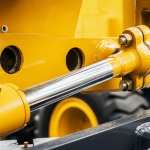Hydraulic vs. Pneumatic Systems: Choosing the Right Option
When it comes to powering machines and equipment, especially in industrial and heavy-duty applications, hydraulic and pneumatic systems are two of the most common choices. Both systems use fluid to transmit power and motion, but they have distinct differences that make them suitable for different scenarios. In this blog, we will explore the key differences between hydraulic and pneumatic systems and help you make an informed decision when choosing the right option for your specific needs.
Hydraulic Systems
Hydraulic systems use a specialized fluid, typically hydraulic oil, to transmit power. These systems are renowned for their high power density, which means they can deliver substantial force even in compact designs. Here are some key advantages of hydraulic systems:
- High Power Density: Hydraulic systems are known for their ability to generate a significant amount of force, making them ideal for heavy-duty applications. They are commonly used in construction equipment, such as bulldozers and excavators, where power and force are critical.
- Precise Control: Hydraulic systems offer precise control over speed and force. This makes them suitable for applications where accuracy and control are paramount, such as in manufacturing processes and automotive brake systems.
- Reliability: Hydraulic systems are known for their durability and reliability.
Properly maintained hydraulic components can last for many years, even in harsh environments. - Wide Temperature Range: Hydraulic systems can operate effectively in a wide temperature range, from extremely cold to extremely hot conditions, making them versatile for various applications.
However, hydraulic systems also come with some downsides:
- Fluid Leakage: Hydraulic systems can experience fluid leakage, which can be problematic in some applications. Regular maintenance is essential to prevent leaks.
- Complexity: Hydraulic systems can be more complex to design and maintain compared to pneumatic systems. They require specialized components and expertise.
- Cost: Hydraulic systems are often more expensive to install and maintain due to the precision components and hydraulic oil required.
Pneumatic Systems
Pneumatic systems, on the other hand, use compressed air to transmit power. They are often chosen for applications where cleanliness and simplicity are important. Here are some advantages of pneumatic systems:
- Clean Operation: Pneumatic systems do not use hydraulic oil, which eliminates the risk of fluid leakage and contamination. This makes them suitable for applications in food processing and cleanroom environments.
- Simplicity: Pneumatic systems are generally simpler to design, install, and maintain compared to hydraulic systems. They require fewer components and are easier to troubleshoot.
- Lower Cost: Pneumatic systems are typically more cost-effective to set up and maintain due to the simplicity of their components.
- Safety: In case of a system failure, pneumatic systems are generally safer because compressed air is less likely to cause harm compared to hydraulic oil.
However, pneumatic systems also have their limitations:
- Lower Power Density: Pneumatic systems have a lower power density compared to hydraulic systems, which means they may not be suitable for applications that require high force or power.
- Less Precision: Pneumatic systems offer less precise control over speed and force compared to hydraulic systems. This makes them less suitable for applications that demand high accuracy.
- Limited Temperature Range: Pneumatic systems are sensitive to temperature changes and may not perform well in extreme hot or cold conditions.
Choosing the Right Option
The choice between hydraulic and pneumatic systems ultimately depends on your specific application requirements. Here are some factors to consider when making your decision:
- Power Requirements: If your application demands high power and force, hydraulic systems are likely the better choice. Pneumatic systems are more suitable for lighter applications.
- Precision: If precise control over speed and force is critical, hydraulic systems offer superior performance. Pneumatic systems are better for applications where precision is less important.
- Environmental Factors: Consider the operating environment. If cleanliness and the risk of fluid leakage are concerns, pneumatic systems may be the better option.
- Cost and Maintenance: Evaluate your budget and maintenance capabilities. Pneumatic systems are generally more cost-effective and easier to maintain.
- Safety: Think about safety requirements. Pneumatic systems are often considered safer due to the absence of hydraulic oil.
Both hydraulic and pneumatic systems have their strengths and weaknesses, and the choice between them should be based on your specific application needs and priorities. Need help deciding which is right for you? At Air & Hydraulic Equipment, Inc., we’re here to help you with any of your industrial automation needs. We offer custom engineering, programming, fabrication, and machining.
Contact us today to learn more about our services.










